Power, Heat and Noise
Aside from performance, the other concerns that follow along with factory overclocked hardware relate to power, heat, and noise. It is important to know if the higher clock speeds will affect any of these aspects of this already demanding technology. We know that Sparkle's Calibre P880+ OC Edition will require more power to run its thermoelectric cooler, but will we get any real benefit out of it? Is EVGA's ACS3 cooling system worth it? First let's look at power draw.
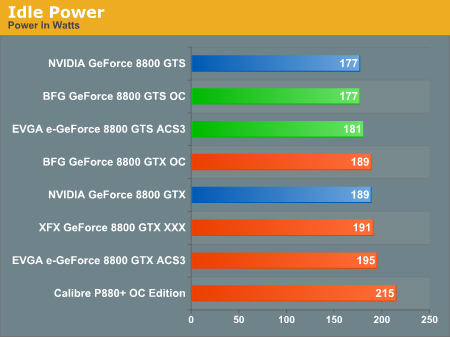
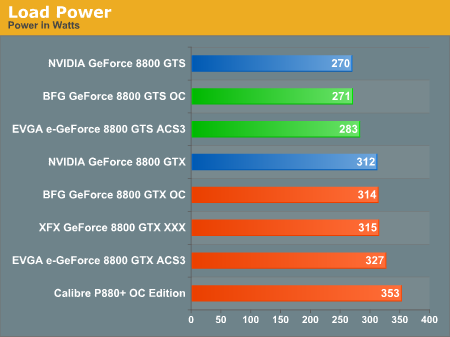
As we would expect, the GTS hardware draws less power than GTX hardware. At idle, there aren't any huge differences with the exception of the Calibre card. This part draws between 20W and 30W more than the other 8800 GTX cards, which seems to be a reasonable amount for moderate thermoelectric cooling. Under load we see similar characteristics. Higher clock speeds do seem to indicate higher power draw, but the difference is not huge.
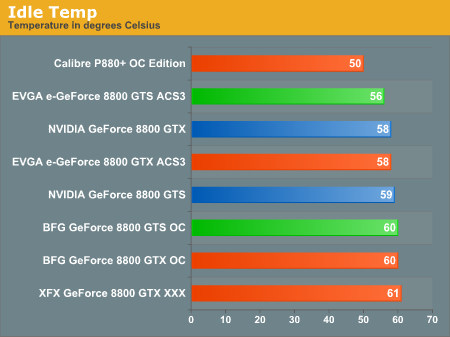
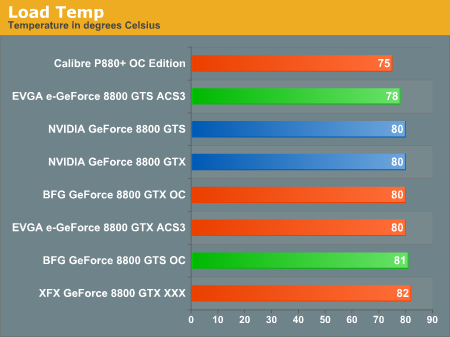
In terms of heat, the Calibre card tops the competition both at idle and under load. This is by far the coolest card of all we tested, although the lower clock speeds likely help. While EVGA's ACS3 system does provide a slight cooling advantage, it isn't huge. The external metal shroud does seem to add a slight benefit, but it seems that the system does more to improve the cool-factor of the cards' appearance rather than physical temperature. At the same time, we are glad to see manufacturers trying new things, and providing a heatspreader on the back of the card is a good move as well.
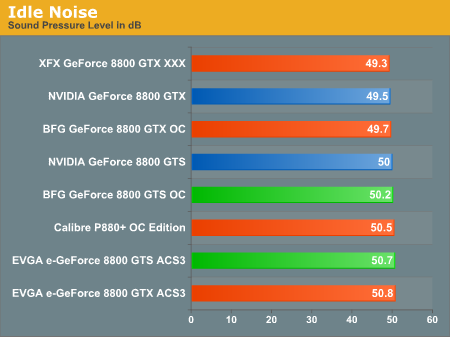
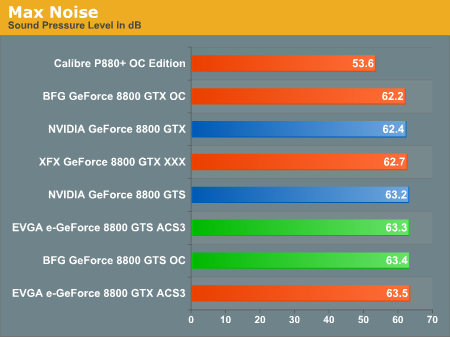
Idle noise was taken after boot, and our max noise number is determined using nTune (or a BIOS flash) to enable the fan to run at full speed at idle. In our environment, fan speed never reached 100% as the card never got hot enough to require it. However, inside a hot case or in a warmer climate, it isn't unreasonable to expect cards to spin all the way up.
At idle, the noise level of most of the cards is within 1 dB of the rest. This means that most of us would be unable to identify an audible difference in volume. Under load, we have nearly the same result, with the clear exception of the Calibre card. With a 10 dB difference, most people would perceive this as at least half the loudness of the other cards. Considering this provides more efficient cooling as well, we are duly impressed with Sparkle's hardware (especially after the poor performance of our early P880+ sample in these areas shortly after the G80 launch).
Aside from performance, the other concerns that follow along with factory overclocked hardware relate to power, heat, and noise. It is important to know if the higher clock speeds will affect any of these aspects of this already demanding technology. We know that Sparkle's Calibre P880+ OC Edition will require more power to run its thermoelectric cooler, but will we get any real benefit out of it? Is EVGA's ACS3 cooling system worth it? First let's look at power draw.


As we would expect, the GTS hardware draws less power than GTX hardware. At idle, there aren't any huge differences with the exception of the Calibre card. This part draws between 20W and 30W more than the other 8800 GTX cards, which seems to be a reasonable amount for moderate thermoelectric cooling. Under load we see similar characteristics. Higher clock speeds do seem to indicate higher power draw, but the difference is not huge.


In terms of heat, the Calibre card tops the competition both at idle and under load. This is by far the coolest card of all we tested, although the lower clock speeds likely help. While EVGA's ACS3 system does provide a slight cooling advantage, it isn't huge. The external metal shroud does seem to add a slight benefit, but it seems that the system does more to improve the cool-factor of the cards' appearance rather than physical temperature. At the same time, we are glad to see manufacturers trying new things, and providing a heatspreader on the back of the card is a good move as well.


Idle noise was taken after boot, and our max noise number is determined using nTune (or a BIOS flash) to enable the fan to run at full speed at idle. In our environment, fan speed never reached 100% as the card never got hot enough to require it. However, inside a hot case or in a warmer climate, it isn't unreasonable to expect cards to spin all the way up.
At idle, the noise level of most of the cards is within 1 dB of the rest. This means that most of us would be unable to identify an audible difference in volume. Under load, we have nearly the same result, with the clear exception of the Calibre card. With a 10 dB difference, most people would perceive this as at least half the loudness of the other cards. Considering this provides more efficient cooling as well, we are duly impressed with Sparkle's hardware (especially after the poor performance of our early P880+ sample in these areas shortly after the G80 launch).










20 Comments
View All Comments
DerekWilson - Monday, March 12, 2007 - link
This launched a week ago and we were not able to get ahold of the OC2 cards for this review. We may look at them in the future though.jniles - Monday, March 12, 2007 - link
well I take evga over bfg, you compare apples to oranges (acs3 to stock)If you take the price premium for the cooler out the evga wins
same or lower price
higher oc
step up program
DerekWilson - Monday, March 12, 2007 - link
What really is the price premium for it? The XFX card is about $620 at slightly lower clock speeds with stock cooling.I'm also not a fan of the step up program the way it is now. Maybe if they extend it a year or so I'd be more impressed. As it is, it's only really valuable if you buy a card right before faster ones come out.
jniles - Monday, March 12, 2007 - link
the EVGA KO edition is $60 more @ the egg , the SUPERCLOCKED version compares with the BFG that you used and is $30 less AR with a higher oc to boot.While I agree that the step up program is short, there is no competition !!!!
And I did use this program when I purchased a 7800 gt and stepped up to a 7900 gt oc (for about $30 shipped) when they launched. Not sure if I will catch the bus this year though (8800 to 8900)
When can we expect the 8900's ?
yyrkoon - Monday, March 12, 2007 - link
I find it a bit dubious that you would give the editors award to a card based on price ?! That and the fact that eVGA does all this using stock cooling ? Why no mention of RMA / replacement 'issues' ?Look guys, I can write my own reviews, on OC'd cards, and choose the best card based on the prettiest graphics, that would not make me 'right'. I thought the whole idea was to benchmark the cards, and pick the card based on the best performer that was able to achieve these speeds stably ?
Now, since we've already been thrown askew, by the obvious 'conclusion' here why dont we talk about part replacement, or the 'gee, I'm already paying $550 for a graphics card, but another $150 is just too much for the best' factor. Why even pick any of these, and why not pick a 7600GT, because it is obviously MUCH cheaper than all these "overpriced cards' . . . Starting to see my point ?
*sigh*
JarredWalton - Monday, March 12, 2007 - link
This is a roundup of 8800 series cards. Given that the largest performance improvement over stock for the GTX was less than 10% (average of maybe 5% at 2560x1600, and less at any lower resolution), and considering the EVGA card was at best about 5% faster than the BFG (and margin of error is at least 2% in testing), would you recommend people spend $620 for the EVGA ACS3 GTX card over the $580 BFG card? We wouldn't - and both companies come with lifetime warranties.Or are you implying the Sparkle card is the "best"? Because that's not really supported by the article in any way. Cooler? Perhaps, but only with lower clocks. Quieter? Yes, but $150 for a quieter card while useful to some isn't what we would generally recommend. It's an interesting card, but with very limited availability, a higher price, and warranty/support that's a bit questionable for much of our audience, it is at best an intriguing card.
The EVGA GTS card shows much better performance improvements, simply because the system is becoming more GPU limited (in some games) at higher resolutions. In the end, the awards given out are for what we feel are the best 8800 GTX and GTS 640 cards; we certainly wouldn't recommend the GTX to many users out there, but if you're in the market for a GTX anyway, the BFG is a good card, and the EVGA is a close second (or it's first if you don't care about price and think you'll see the extra 5% performance).
yyrkoon - Monday, March 12, 2007 - link
Well, If the margin for error is truely 2%, then sure, the speed difference could only be 3% more in favor of eVGAs card vs the BFG card, however, this also works in the reverse, it could be as high as 7% faster.For me, the process of buying anything comes down to, getting the best I can possibly get for the amount of money I am prepared to spend. Speed does play a factor in my purchasing descission somewhat, but takes a back seat to things like: what is the companies reputation for dealing with their customers, how much do I really want to spend on other components that are required for the part (IE, will my current power suppy handle the added load of product I am considering purchasing, and if not, do I really want to buy another one), etc.
However, all this being said, I belived this to be an article about finding the fastest 8800 card, and praising it, not 'compromising'. You, all at anandtech, just like me are entitled to your own opinions though . . .
Personally, I would not even consider one of these cards, they cost way more than I'm willing to spend, and I consider myself a very serious gamer, BUT, if I had the cash to blow, it would most likely buy something from eVGA, and something fast. This is not to say that sparkle does not have a good reputation, because from my experiences, and what I've read, they treat their customers very well, but the combination of the TEC unit on the card (drawing too much power, and it is still relitively new technology in computers), I would probably balk at buying it. They do make very good (or have in the past) ATI cards though.
AmbroseAthan - Monday, March 12, 2007 - link
I feel the 40 extra dollars is worth it for the EVGa card. While they both have lifetime warranties, EVGa's covers overclocking. So you could buy the card and push it farther then it currently is. You are also allowed to switch the Heatsink without the warranty being voided, as long as you replace it with the stock one if you need to RMA.DerekWilson - Monday, March 12, 2007 - link
I'd also like to add that our recommendations are based on what we see as the most important aspects of the product.The EVGA GTX is absolutely the fastest card we've got. If that's what you want, the article is clear on which card you should buy.
Our goal is to provide the best information possible throughout the article so that everyone interested in the topic can make their own decisions based on the data. We hope our recommendations will be helpful to people, but they are no substitute for the rest of the article.
rallyhard - Monday, March 12, 2007 - link
Well put.